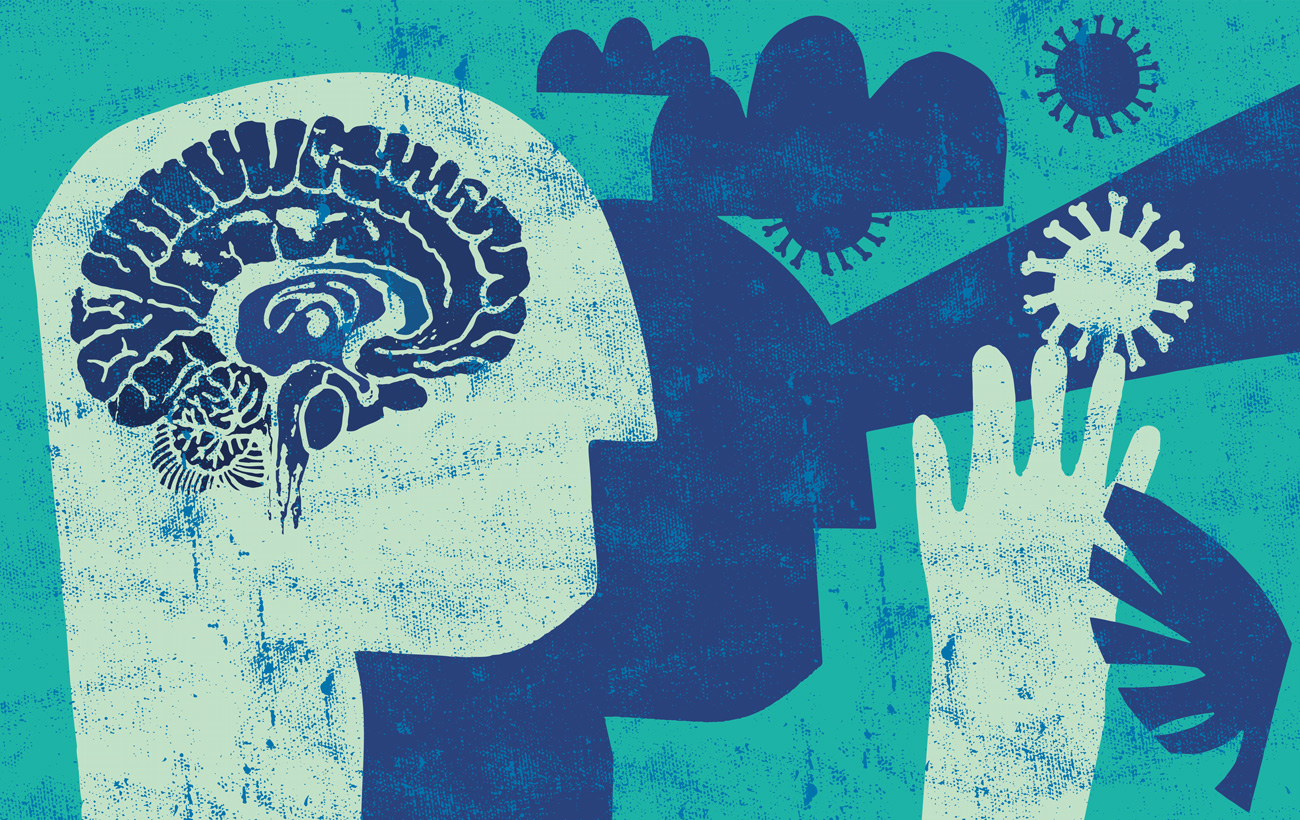
Has The Pandemic Affected Your Mental Health?
The COVID-19 pandemic has affected the global population, with hundreds of millions of cases; however, what is also alarming is the mental health pandemic – the rise in mental health issues associated with the indirect, but far-reaching, impact of the virus.
The Office for National Statistics (ONS) has reported that one in five adults in the UK say that they have experienced some form of depression during the COVID-19 pandemic.
The number of self-reported mental health issues has also increased since the beginning of the pandemic, with the number of adults experiencing some form of depression rising from 19% in June 2020, to 21% by the third lockdown (December 2020 to March 2021).
Here, we look at how the pandemic has affected, and still continues to affect, daily life, and how this is linked to a national rise in mental health issues.
The Pandemic As A Barrier For Seeking Help For Mental Health
Not only has the pandemic been a catalyst for mental health issues, it has also been an obstacle for those who need psychiatric help. According to the ONS, ‘there has been a 30% decrease in all diagnoses by GPs in England during late March to the end of August 2020, with the number of depression diagnoses falling from 1,131,804 in 2019 to 863,578 (a 24% decrease)’. This, in correlation with the rise in self-reported cases, indicates that people are not seeking help for their issues during this time. This could be due to:
- Fear of contracting the COVID-19 virus while visiting a health professional
- Anxiety about leaving the house due to spending a long time inside during lockdown
- Not wanting to be a burden on an already stressed healthcare system
- Being unable to get an appointment due to a patient backlog
Christos Kouimtsidis, Consultant Psychiatrist at The London Psychiatry Centre, explains, “The COVID-19 pandemic is a double edged sword in terms of mental health. Firstly, people are becoming anxious due to fear of contracting the virus, then depressed due limited social contact, financial worries, and more. Then, there are barriers to receiving treatment, such as a fear of visiting a clinical environment or perhaps limited availability with a GP practice. However, it is possible to improve mental health without attending an in-person appointment. Video and phone consultations have been very helpful for many patients, and it is also important to have a good support system from friends and family, get outside regularly and reduce stress at work where possible.’
Health Anxiety And COVID-19
COVID-19 is a novel coronavirus, which means that it is a new pathogen of a known type (the type being coronavirus). Although there is a lot we know about coronaviruses, this particular pathogen is new to the scientific and healthcare communities, which means that there have been a lot of unexpected discoveries in the way that it interacts with the human body. Understandably, this causes many people to suffer from health anxiety, or, anxiety about what will happen if they contract the virus.
This can lead sufferers to isolate themselves from society, develop an anxiety and/or sleep disorder, and there is even a possibility of developing an obsessive compulsive disorder (OCD) around cleaning themselves, their surroundings and those within their home such as children.
Those with health anxiety may also be reluctant to take the COVID-19 vaccine, or seek medical help for other medical conditions to avoid visiting a hospital or clinic.
Substance abuse
Consumption of alcohol, sedative medication and over the counter medication has increased during the pandemic, sparking concerns about addiction and substance abuse as a coping mechanism. In the period between March 2020 and March 2021, it has been revealed that there was a 58.6% increase in drinking at increasing risk and higher risk levels. Meanwhile, a study of reports from several countries states a general increase in use of benzodiazepines, a common sedative often used in the treatment of anxiety and insomnia.
HOW TO HELP
The signs of substance abuse differ for everyone, but some common signs include:
- Hiding alcohol or medication
- Risky behaviour
- Increased aggression and/or irritability
- Anxiety and/or depression
- Physical symptoms including bloodshot eyes, dilated pupils, weight loss or gain, visible tiredness
If you suspect a loved one of abusing or having a dependency on alcohol or drugs by recognising these signs in their behaviour and appearance, try talking to them without being negative or judgemental, and offer to get them help. Offer your support and try to sway them away from situations where they might be prone to consuming alcohol or drugs. You may also want to consider an intervention with a group of people who care about and can help your loved one get better.
Work-related stress
Frontline workers
Frontline workers across the world have had to put themselves at risk throughout the pandemic, perhaps even working longer hours due to staff shortages, and under more intense and stressful conditions. This, coupled with the worry of being at a higher risk of infection, are just a few of the reasons why frontline workers are more likely to experience high levels of stress, burnout, anxiety and depression during the pandemic. The British Medical Association conducted a study which revealed that over 28% of doctors have suffered from depression, anxiety, stress, burnout, emotional distress or other mental health condition, which has been worse during this pandemic than before.
Working from home
Much of the population has experienced a shift from office work to working from home. For some, this has been a positive change, with an end to stressful commutes and the ability to spend more time with family. For others, this may have been a trigger for depression or anxiety due to lack of definition between work and home life, too much time spent with the same people and/or not enough contact with colleagues and working longer hours.
Furlough and redundancy
Finally, there are those who have been placed on furlough during the pandemic, or experienced redundancy. While the furlough scheme has been a lifeline for many, others may have been greatly affected by their lower income, causing financial anxiety and stress which may be exacerbated by the uncertainty of when they can return to work. Redundancy, of course, causes these same stresses, and may even place stress on other members of the household who feel that they might have to make up the lost income.
All of these situations are made worse by the lack of relief in the form of a holiday, socialisation and other recreational activities. With the difficulties of international travel, and even domestic travel during lockdown periods, some employees have resorted to spending paid holiday leave at home, where some have even resorted to working to fill the time – or not taking leave at all. Working without a considerable break, or a reward such as a holiday to look forward to, is unsustainable and can result in a build-up of stress and, eventually, burnout, which is not only dangerous from a mental health perspective, but can affect future performance at work. Symptoms of burnout include:
- Fatigue and exhaustion
- Insomnia or disturbed sleep
- No enthusiasm for work
- Constant feelings of negativity towards your work
- Anxiety and dread about starting the working day
- Inability to perform at your job
HOW TO HELP
Talk to your employer
Many employees are reluctant to tell their employers about their mental health issues, for fear that they may not be taken seriously. However, mental health training in many larger businesses facilitates HR departments to put staff in connection with a mental health professional if necessary. At the very least, asking for time off may help you reduce stress temporarily while you make a decision on how best to improve your mental health in the long run.
Improve your work space
Whether you are working from home or in a communal environment, your workspace should provide you with everything you need to do your job properly, as well as being comfortable and pleasant to work in. Ensure that you are in visibility of natural light; buy yourself or ask your employer for an ergonomic chair; and, if possible, decorate your workspace with items that give you joy, such as a family photo or a houseplant.
Maintain a good work-life balance
If much of your life revolves around work, and you are unhappy with this balance, try to improve your personal well being outside of work. This could be by developing a hobby, spending quality time with your friends or family, or taking time to really relax and switch off from your working life. Your personal time should be valuable to you.
Loneliness And Isolation During the Pandemic
We have written about loneliness and lockdown before, but lockdown has not been the only aspect of the pandemic that has caused loneliness. Post-lockdown, other causes of loneliness have included:
- Social distancing
- Self-isolating
- Limits on travel
- Restrictions on the number of people that can meet up at once
- The closure of key venues for socialising, such as bars and restaurants
- School closures
Increased loneliness during the pandemic has been linked to the younger generations, who will have been adversely affected by the above restrictions due to the need for socialisation at this key point in life. In late 2020, 69% of teenagers said they felt alone “often” or “sometimes”, while 35% reported feeling lonely often or most of the time despite spending three hours on social media. Meanwhile, other areas of society greatly affected by loneliness during the pandemic include the elderly, single person households and those living in areas with high unemployment.
HOW TO HELP
Reach out to friends and family
There are many ways to communicate with people in today’s world, even those who live further away. If you have social anxiety about making conversation, try to arrange the communication to center on something active, like a game, quiz or even watching a TV show together while talking on the phone or Zoom.
Check in on others
Don’t forget that other people are likely to be lonely during this time too. By taking the focus off yourself, it may help you gain a sense of purpose while also filling your need for communication.
Do more of what you enjoy
If you have to spend time alone, use it to focus on something you enjoy. This can take your attention away from feelings of loneliness, while helping you develop a hobby. If the opportunity arises, join a group that focuses on something you enjoy, such as a walking club, art class or community gardening group.
Getting Help For Mental Health During COVID-19
The pandemic has been a difficult time for everyone, but if your mental health, or the mental health of someone you know, has been adversely affected during this time, it is important to seek help. At The London Psychiatry Centre we offer in-person appointments, as well as telephone or video appointments for those unable to leave their homes. Get in touch with us using the details below:


